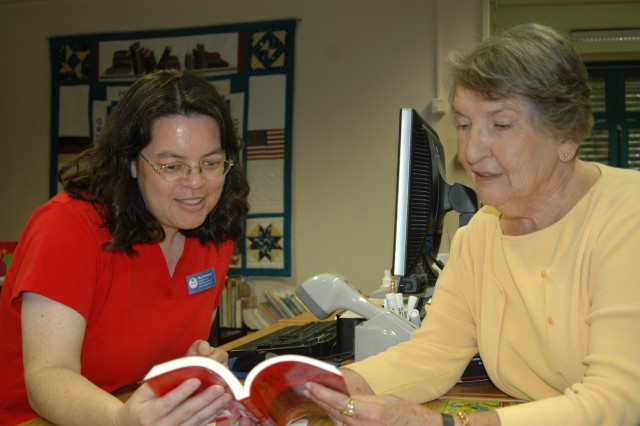
HEIDELBERG, Germany -- As a 22-year old in 1948, Nancy Werner Dulin came to Heidelberg for the first time to work as a War Department civilian.
"Of course I wanted to travel as far and wide as I could, so I took a job with the Army, which was the only way that you could travel in Europe in that time," she said. "Because of the occupation, it was restricted to tourists.
"I guess I could have been sent anywhere in the world because I left my options totally open, but of course where they sent me was Heidelberg."
Dulin remembers flying from Massachusetts to Frankfurt on an old turbo-prop plane delivering mail. They flew into Frankfurt during the Berlin Airlift, she said, and were put on buses in the total darkness. The first lights they saw were the interior of their hotel rooms. The next day, she woke up and took the picture that now appears on the cover of her book - the rubble at the Frankfurt main train station. She traveled to Heidelberg that day by train, which ended up taking about seven hours.
She has since been to Europe several times, but most recently returned to Heidelberg June 29 and visited the Patrick Henry Village library to present a copy of her book, "Renate's Journey," a chronicle of Heidelberg in the four years immediately following World War II.
Inside the donated book, she wrote a message to the current residents of Heidelberg.
"I hope they enjoy learning about what it used to be and a bit of its history," she said.
"(I hope they get) the appreciation for what war did not just to Heidelberg, but to Germany, and the trauma that it caused to the people. I hope they get an appreciation for exactly what it was like and how long it was like that after the war."
Dulin married her husband, Ralph, an American Soldier, in 1950 and moved with him back to the States in 1952 so he could use the G.I. Bill and go to school.
She said they lived in the country, and with free time on her hands, she decided to write a book.
At the time, she said she was "so full of experiences that in 1952, I wrote the book and I sent it off to an agent in New York who really rather liked it. She tried to show it around, but said it was too soon after the war. People were not ready to accept Germans as protagonists."
So, the manuscript was packed away and forgotten about. Years later, when moving to Sarasota, Fla., for retirement, the manuscript was found amongst her boxes of things that had been stored for years in Bayonne, N.J.
"I spent my retirement re-writing," she said. "You learn a lot in 50 years. I was 24 or 25 when I wrote it the first time. I was 65 or 70 when I re-wrote it, but I didn't change any of the basics. I left them there because I thought when I wrote it the first time, they were fresh and brand new, and why mess with that'"
She was 78 or 79 years old when it was finally finished again, she said.
"At that age you just don't want to go through the process of submitting it," she said. "I tell people I don't handle rejection well - I didn't want to collect all those slips of paper that say no - so I self-published."
The book is about a young woman, Renate, struggling to survive in post-WWII Germany, beginning in the spring of 1945 and following the seasons through winter 1949.
"I feel like the book has been authenticated not just by me, I think it was authentic because I lived there," she said. "I lived through it, but I was an American living through it."
In addition, Dulin's family helped her authenticate the time period. She also had friends who were German soldiers during the war read the book to make sure it was accurate.
"Now, it's done," she said. "I'm not on a crusade of any kind, but I just think those years are too important to forget. It was a horrendous time here. It was a hard, hard time. What I have written in the book is as it was in those years."
For more information, visit www.renatesjourney.com.
(Editor's Note: Kristen Marquez works in the USAG Baden-Wuerttemberg Public Affairs Office).

Social Sharing